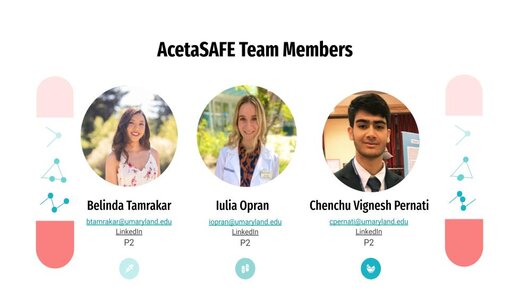America's Got Regulatory Science Talent Turns 10
Every winter, the University of Maryland Center of Excellence in Regulatory Science and Innovation (M-CERSI) invites students from both the University of Maryland, Baltimore (UMB) and University of Maryland, College Park (UMCP) to take part in its America’s Got Regulatory Science Talent competition, which aims to promote student interest in the science of developing new tools, standards, and approaches to assess the safety, efficacy, quality, and performance of U.S. Food and Drug Administration (FDA)-regulated products. M-CERSI held its 10th annual competition on Feb. 4.

Second-year student pharmacists Iulia Opran, Chenchu Vignesh Pernati, and Belinda Tamrakar of team AcetaSAFE took first place in the 2022 America’s Got Regulatory Science Talent competition.
“This is my favorite activity,” exclaimed James Polli, PhD, the Ralph F. Shangraw/Noxell Endowed Chair in Industrial Pharmacy and Pharmaceutics at the University of Maryland School of Pharmacy (UMSOP) and co-principal investigator of M-CERSI. “I have been very pleased with the teams over the past several weeks. I’m happy to say that the teams — while passionate about their ideas — have always thought of evidence for and against their ideas.”
This year, three UMSOP teams presented their projects virtually to three FDA judges.
Second-year student pharmacists Iulia Opran, Chenchu Vignesh Pernati, and Belinda Tamrakar of team AcetaSAFE presented their idea to develop a QR code for over-the-counter (OTC) acetaminophen and prescription medications. The team’s aim is to improve patient knowledge of acetaminophen dosing. The group found that patients often lack clear understanding of their appropriate acetaminophen dosing for different health needs, which can put consumers at risk of an overdose. When acetaminophen is taken in excess, it can cause long-term effects on the liver, the group said. Given this, the team believes that a QR code will help improve patient education, raise awareness of OTC and prescription drug toxicity, and decrease hospitalization costs. The AcetaSAFE team was awarded first place for its presentation, which the judges described as interactive and transformative.
First and second-year student pharmacists Joanna Shaju, Rebecca Faulkner, Sumbel Malik, Ivan Jay Bauzon, and Sabrina Wang of team Keeping Blood Glucose SweetNLow presented their idea for optimizing continuous glucose monitoring devices by incorporating patient-centered outcomes as research prompts for diabetes patients. There is currently no one-size-fits-all solution for diabetes patients. Recognizing this, the team proposed a standard interface through which a patient could monitor subjective data — including symptoms, daily activity, or health complications. The platform would also offer prompts that would appear when a patient’s glucose levels are outside their target range. In this way, Team Keeping Blood Glucose SweetNLow aims to make diabetes care more personalized and easier for patients to manage. Team SweetNLow was awarded second place for its idea, which the judges noted to be interesting and innovative.
Lastly, Travel Rx, led by third- and fourth-year student pharmacists Sean Mujin Kim, Alex Livingston, and Karen Nguyen, presented a concept for an application platform that would allow users to find appropriate over-the-counter medications in foreign countries. The project aims to address common obstacles global travelers might encounter when purchasing medicine, such as language barriers, challenges with locating or understanding drug information, or challenges with locating a pharmacy.
The two award-winning teams will have the opportunity to present their innovative ideas to the FDA’s Office of the Chief Scientist.
This event is supported by the Food and Drug Administration (FDA) of the U.S. Department of Health and Human Services (HHS) as part of a financial assistance award U01FD005946 totaling $1,000 with 100 percent funded by FDA/HHS. The contents are those of the author(s) and do not necessarily represent the official views of, nor an endorsement, by FDA/HHS, or the U.S. Government.



